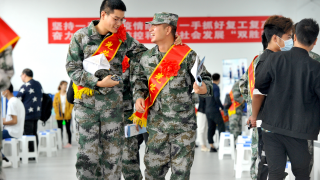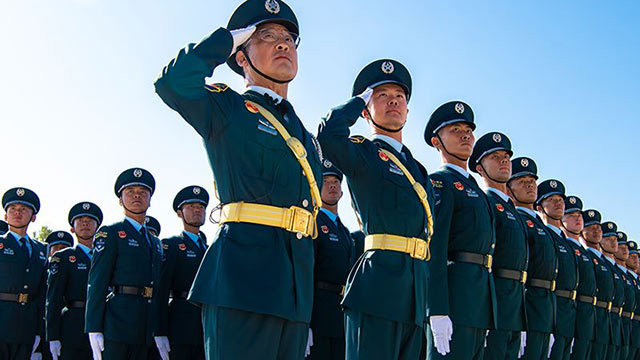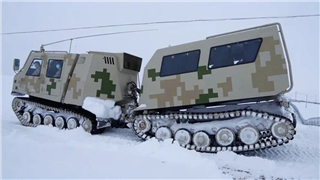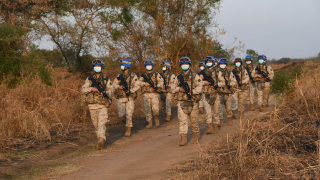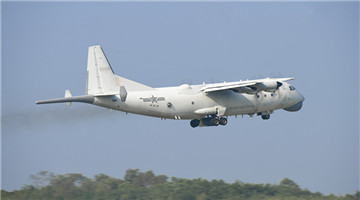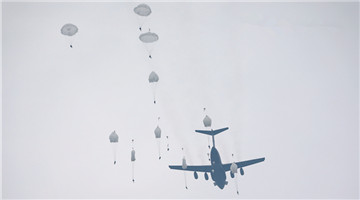By Jiang Tianjiao
江天骄
The American side’s denial of the Yoon Suk-yeol administration’s recent statement that the two countries are discussing the possibility of conducting nuclear exercises and seeking to share America’s nuclear weapons reflected an intriguing shift of attitude.
近期,韩国尹锡悦政府表示正与美国探讨开展“核演习”并寻求共享美国的核武器。美国方面则是矢口否认,这耐人寻味。
The Biden administration’s overt rejection of the ROK’s pursuit of the so-called bilateral nuclear exercise is based on three deep-level considerations. First, the US rather than the ROK holds the initiative in bilateral alliance. Whether to carry out the so-called “nuclear exercise” should be America’s call rather than being proposed by the ROK. Second, Washington is making a veiled withdrawal to give Pyongyang a warning. Washington’s rejection of the US-ROK nuclear exercise is a step to both avoid an escalation of the peninsular situation and to try DPRK’s reaction. Biden administration may be waiting for the right timing with “nuclear exercise” as an ace up its sleeve in response to the actions that Pyongyang may take, thus giving itself ample leeway. Third, Biden still hopes to reserve some space for talks on non-proliferation and arms control. If his administration accepts ROK’s proposal to hold a nuclear exercise, that’s equivalent to agreeing to share nuclear weapons with it, which may trigger the chain effect of nuclear proliferation across the whole Northeast Asia. As a Democratic president, Biden, as convention has it, should be more positive on non-proliferation and arms control. This, coupled with his early-year experience in pushing the nuclear disarmament between the US and former Soviet Union, probably makes him, in the final stage of his political career, unwilling to be criticized – much less remembered – for providing nuclear weapons to other countries.
美国方面,拜登政府对韩国谋求所谓韩美“核演习”表面上拒绝,实则至少有三方面的深层意图:一是明确韩美同盟的主动权在美不在韩。无论是否开展所谓“核演习”,都应当由美国说了算,而不是反过来由韩国提议。二是以退为进,敲山震虎。拜登政府眼下拒绝韩美“核演习”的说法,既是避免主动引发半岛局势失控升级,又是试探朝鲜方面的反应。拜登政府或在等待时机,将“核演习”作为后手以威慑朝鲜方面可能采取的行动,从而确保自身处于进退自如的境地。三是拜登个人仍希望在防扩散和军控领域留有颜面。如果接受韩国提出的“核演习”要求,那几乎等于同意向韩国共享核武器甚至引发整个东北亚核扩散的连锁反应。拜登作为民主党总统,按惯例在防扩散和军控问题上态度要相对积极,再加上其早年致力于推动美苏核裁军的经历,想必不愿在政治生涯末期背上向他国提供核武器的骂名。
However, even if Biden doesn’t say yes now, his strategy of consistently advancing “extended deterrence” in Northeast Asia and the entire Asia Pacific in the coming period will remain unchanged, and his country will continue to function as a nuclear protector. There are three reasons for this.
然而,即便拜登此刻不答应,在今后一段时期美国在东北亚乃至整个亚太地区持续推进“延伸威慑”的战略不会改变,并将进一步发挥核保护伞的作用。其主要原因有三:
First, the Russia-Ukraine conflict has taken a far-reaching and deep-going toll on the global geopolitical map and international security governance structure and has considerably augmented the possibility of nuclear proliferation. For one thing, the complete rupture of US-Russia ties makes their original bilateral arms control system hard to sustain and forces both sides to step up the R&D and deployment of new-generation strategic weapons. An arms race between the world’s two major powers may jeopardize global strategic stability and put security pressure on other nuclear weapon states. For another, the Russia-Ukraine conflict has exposed the defects in the current international security governance mechanism, prompting some non-nuclear weapon states to actively seek to own nuclear weapons for “self-protection” and others to seek nuclear protection from the US or even to share nuclear weapons with it.
一是俄乌冲突对全球地缘政治版图和国际安全治理结构的负面影响深远,导致核扩散的压力显著提升。一方面,美俄关系彻底破裂使得原有的双边军控体系难以为继,美俄双方都在加紧研发和部署新一代战略武器。美俄军备竞赛或打破全球战略稳定,给其他有核武器国家带来安全压力。另一方面,俄乌冲突暴露出当前国际安全治理机制仍不健全,部分无核武器国家积极寻求“拥核自保”,一些国家选择美国加强核保护伞甚至是共享核武器。
Second, the US provided nuclear protection for its Northeast Asian allies to the point of “quasi-sharing” of nuclear weapons during the Cold War period. Declassified files show that the US deployed up to 3,200 pieces of nuclear weapons at the forward land position in the Pacific region in 1967, including about 1,000 pieces in ROK, although to keep the ROK troops from using these weapons and consequently triggering a World War, the US forces in ROK strictly controlled the right of launch and withheld key information such as types of weapons and location of deployment. Therefore, the ROK side never really shared nuclear weapons with the US. Likewise, the US also deployed nuclear weapons at the forward position of Japan, but secretly through a “secret pact” because of the strong anti-nuclear sentiments in Japan then arising from the atomic bombing in Hiroshima and Nagasaki. Although the US pulled away those nuclear weapons after the Cold War, the conservatives in Japan and ROK have never given up on possessing them.
二是早在冷战时期,美国就对东北亚盟友提供核保护伞,甚至出现过核武器“准共享”的历史。解密档案显示,1967年,美国在整个太平洋地区的陆地前沿部署的核武器达到3200枚的峰值,而其中大约有1000枚部署在韩国。当然,为了防止韩军突然使用这些核武器从而引发世界大战,驻韩美军严格控制着发射权乃至武器型号、部署地点等关键信息。因此,韩国方面从未真正共享过美军的核武器。同样,美国当时也在日本前沿部署核武器。但由于受广岛和长崎原子弹的影响,日本当时反核情绪严重。美国在日本的核武器部署只能以“核密约”的形式悄悄进行。冷战后,美国虽然撤走了这些核武器,但日韩两国的保守派却对“拥核”念念不忘。
Third, over the years, the US-led NATO has established a whole set of “extended deterrence” system, and there is a growing possibility of the US copying this system in Northeast Asia or the whole Asia Pacific. In the early stage of the Cold War, the Eisenhower administration actively shared its nuclear weapons with NATO allies, and let them hold a launch key through a “two key” mechanism. After the Cold War, the US continued to deploy nuclear bombs at the forward position of Europe and allowed its allies to pilot warplanes to drop them – a sign of equal participation and clear division of work. In Northeast Asia, the US already formed the “extended deterrence” dialogue mechanism with Japan and ROK separately around 2010 in imitation of NATO’s nuclear consultation mechanism. Today those two countries, once again copying the NATO model, proposed to drop the nuclear weapons deployed by the US on their soil with their own air force and warplanes in order to intensify nuclear protection.
三是多年来以美国为首的北约大致建立了一整套“延伸威慑”体系,而美国将北约模式复制到东北亚乃至亚太地区的可能性正在增加。冷战初期,美国艾森豪威尔政府曾积极对北约盟友进行核共享,甚至通过“双重钥匙”机制让美军和盟军各自掌握一把核武器的发射钥匙。冷战后,美国更是继续保留在欧洲前沿部署核炸弹,并通过由盟军驾驶战机来投掷这些核炸弹的方式来体现所谓各司其职、平等参与。东北亚方向,早在2010年前后,美国已经效仿北约核磋商机制,分别同日本和韩国建立了“延伸威慑”对话机制。如今,日韩两国又再三提出要效仿北约模式,通过由两国空军驾驶战机投掷美国前沿部署核武器的方式来强化核保护伞。
Further intensification of America’s “extended deterrence” system would add another to the pile on the security and stability in Northeast Asia or even the world at large. Bearing the brunt is the Korean peninsula nuclear issue. Any step by the US-Japan and US-ROK alliances toward nuclear sharing and exercise will only aggravate the tension on the peninsula and increase the risk of a nuclear war. Moreover, if Japan and ROK, being non-nuclear weapon states themselves, get their hands on nuclear weapons, they would send subversive shock waves across the international non-proliferation system. Previously the AUKUS nuclear submarine cooperation was already a gross violation of the purposes of the Treaty on the Non-Proliferation of Nuclear Weapons (NPT) and tempted many in Japan and ROK to call for similar cooperation. Therefore, the nuclear sharing with these two countries would also start chain effects among other non-nuclear weapon countries. The wide possession of nuclear weapons will spell disaster for international security and stability. At last, countries threatened by America’s “extended deterrence” system will be forced to take necessary military reactions to ensure their own security. Such a strategy will undoubtedly take Northeast Asia and the world in general to further division and confrontation, and will eventually backfire and put America in a greater sense of insecurity.
美国“延伸威慑”体系若进一步得到强化,对东北亚地区乃至全球安全稳定来说无疑是雪上加霜。首当其冲的是朝核问题。如果美日、美韩同盟朝着核共享、核演习的方向发展,只会增加半岛局势的紧张乃至核战争的风险。其次,日韩作为无核武器国家若染指核武器,将对整个国际防扩散体系带来颠覆性冲击。此前,美英澳核潜艇合作已经严重违背《不扩散核武器条约》的宗旨,并引发日韩国内效法开展核潜艇合作的错误呼声。一旦美国向日韩核共享,必将在其他无核武器国家中产生连锁反应。人人拥核将给国际安全与稳定带来灾难。最后,受到美国“延伸威慑”体系威胁的国家将不得不做出必要的军事回应以确保自身安全。美国的“延伸威慑”战略无疑是将东北亚乃至全球带向进一步分裂和对抗的邪路,最终只会让自己陷入更大的不安全当中。
(The author is an associate professor at Fudan Development Institute)
(作者是复旦大学发展研究院副教授)
Editor's note: Originally published on huanqiu.com, this article is translated from Chinese into English and edited by the China Military Online. The information and opinions in this article do not necessarily reflect the views of eng.chinamil.com.cn.
